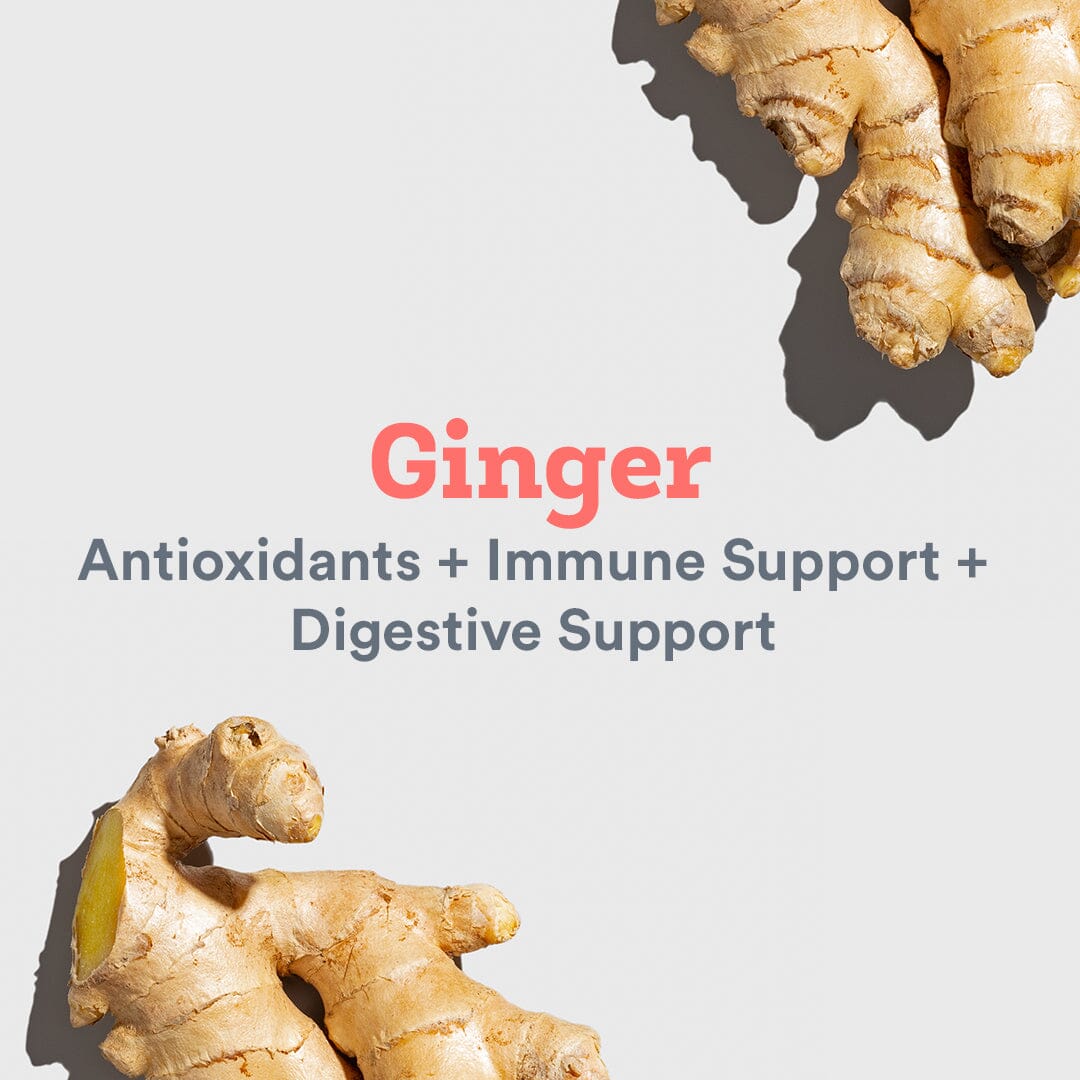
Scientific/Latin name: Zingiber officinale
Also known as: Amomum Zingiber, Ardraka, Black Ginger, Cochin Ginger, Gan Jiang, Gingembre, Ginger Essential Oil, Ginger Root, Imber, Jengibre, Jiang, Kankyo, Kanshokyo, Nagara, Race Ginger, Racine de Gingembre, Rhizoma Zingiberi, Zingiberis Recens, Sheng Jiang, Shoga, Shokyo, Shunthi, Srungavera, Sunth, Sunthi, Vishvabheshaja, and other names.
Native to: Southeast Asia
Parts used: Underground stem/root, or rhizome
Top benefits: Digestive & Gut Support, Ease respiratory conditions and Antioxidant rich

Ginger. The fiery, zingy root with massive flavor and health benefits
It flavors foods, cleanses the palate, and appears right next to your lump of wasabi on a sushi plate. Yet this spicy root probably hasn’t taken up too much of your thoughts.
However, ginger has surprising health benefits, ranging from supporting healthy blood sugar levels, blood pressure, and LDL cholesterol levels, to relieving muscle pain and menstrual cramps.
In this comprehensive guide, we’ll tell you everything you need to know about it, including how to use ginger to help support bodily functions like digestion and protect your cells against oxidative stress.
What Is Ginger?
Ginger (Zingiber officinale) is a large tuberous perennial plant native to southern Asia, now cultivated extensively in almost all tropical and subtropical countries. The underground stem, or rhizome, of the ginger plant, commonly known as the ginger root, is well-known for its medicinal properties.
History of Use
Ginger has been used in Asian cultures as a medicine for millennia, recorded in early Sanskrit, Chinese, ancient Greek, Roman, and Arabic medical literature. In Ayurvedic and traditional Chinese medicine as well as herbal medicine, it is a key herb used for conditions of both the respiratory and digestive tracts.
Ginger’s healing properties are supported not only based on its history of use in these well established systems of traditional medicine, but also a more recent and extensive body of phytochemical studies as well as animal and human clinical studies. Ginger contains a number of key vitamins and minerals, and most of its health benefits are derived from gingerol, a compound with potent antioxidant and anti-inflammatory properties. Common forms of ginger include the fresh or dried root (whole or ground), tablets, capsules, liquid extracts, teas and essential oil.
Health Benefits of Ginger
Ginger has a very prominent flavor that many people either love or hate. If you have a particular affinity for ginger, you’re probably already getting some of its benefits in your diet.
If you’re the type of person who immediately slides the sliced ginger from your sushi plate or quickly passes on gingersnaps, you could be missing out on some pretty impressive ginger benefits.
Luckily, ginger has few side effects, so it’s relatively safe to consume.
Antioxidants
Antioxidant compounds present in plants play a vital, health-protecting role in human life. Antioxidants have been shown to help protect against various metabolic diseases, heart disease, brain disorders and age-related syndromes, as they help the body combat cellular damage caused by free radicals (reactive chemicals containing oxygen).
Specifically, antioxidants can support your cellular health against oxidative stress. Your body produces free radicals when you are exposed to external stressors like UV rays, pollution, and cigarette smoke, and also as a byproduct of normal metabolic processes.
These molecules damage your cells, and that damage can replicate into new cells upon proliferation. Studies have even shown that ginger may help relieve pain, which may be related to inflammation caused by oxidative stress. Because it helps with oxidative stress, ginger can help support cardiovascular health.
Researchers have identified over 40 antioxidant compounds from Ginger. Its potent free radical-scavenging activities and antioxidant properties are attributed to a number of phenolic and flavonoid compounds which have been isolated and in particular, a key compound called gingerol. In a 2017 study, daily supplementation of ginger extract was shown to significantly increase antioxidant activity and reduce oxidative marker levels in cancer patients undergoing chemotherapy.

Digestive & Gut Support
The effects of ginger on digestion make it a useful and natural way to help alleviate occasional digestive discomfort like symptoms of nausea, heartburn, upset stomach, and even morning sickness from pregnancy. Ever notice how many people order a ginger ale from the flight attendant in the air? It’s because ginger supports digestion and helps alleviate symptoms of motion sickness.
Ginger is traditionally used in herbal medicine to provide relief from digestive upset, including gas and bloating, lack of appetite, nausea, digestive spasms and indigestion.
In Traditional Chinese Medicine, Ginger is thought to target the spleen, which assists with digestion, and the stomach, responsible for digestion as well as the movement of digested food doward to the intestines. Key gastrointestinal conditions for which Ginger is used include abdominal pain, vomiting and diarrhea.
In small studies, Ginger has also been shown to accelerate gastric emptying in both healthy subjects as well as patients with chronic indigestion. Helping move your food along can help assist with better digestion and help you avoid discomfort, especially if you’ve had a large meal.
Respiratory Conditions
Ginger is traditionally used in herbal medicine as an expectorant and cough suppressant, and to help relieve bronchitis, coughs and colds.
In Traditional Chinese Medicine, dried Ginger is considered an herb that is ‘hot’ in nature and fresh Ginger is considered a “warm” herb. Both are used to warm the body’s interior, expel cold, warms the lungs and as an expectorant of phlegm. Key respiratory conditions for which Ginger are used include congestion, common cold, coughing and asthma.
Don’t worry. If the thought of consuming raw ginger (or even dried ginger) doesn’t sound appealing, you can get the same great ginger benefits in a food-grade ginger supplement and avoid the need to consume the little ginger strips with your dragon roll.
If you do enjoy ginger, there are plenty of ways you can use it. Ginger tea is a popular option, as is stir-fry with added diced ginger or adding ginger to your smoothie.
The health research presented in this article is for informational use only. It is not a replacement for professional health advice and should not be construed as a recommendation of specific products. The products sold on this website are not intended to diagnose, treat, cure, or prevent any disease. This information does not provide dosage or format recommendations or possible drug interactions, and accordingly, should be used with the advice of a qualified health care practitioner.
